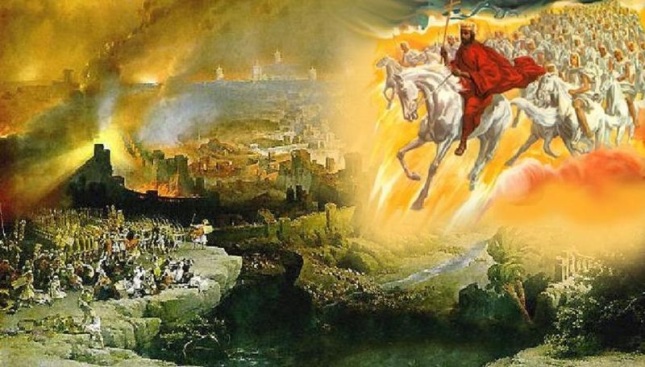
from Google Images
The Scriptures identify the great harlot’s judge as God, himself, saying he is strong, implying that his judgment is sure to occur (Revelation 18:8). Moreover, such a judgment – death, mourning and famine – would come in a single day! However, this shouldn’t be understood to be a literal day, as indicated in Revelation 18:10, 17, 19, where her judgment had come upon the great harlot in one hour, instead of a day. The sense seems to be that judgment would come quickly and suddenly, similar to what the Lord had claimed in his Olivet Prophecy (Matthew 24:36-42). There, Noah’s preaching ministry about the coming judgment lasted 120 years (cp. Genesis 6:3), but no physical event supported Noah’s prophecy until the day and the hour the floods finally came. On the contrary, everything appeared normal, but judgment fell immediately following Noah and his family entering the ark (Matthew 24:37-39; Luke 17:27). Read the rest of this entry »
Tags: Babylon, great harlot, High Priest, Jerusalem, lovers, Olivet Prophecy, Prince that would come, Rome, Titus, war

from Google Images
After the elect were safe (Revelation 18:4), the text concludes that the Lord remembered the iniquities of the great harlot (Revelation 18:5-6). It is not that the Lord had forgotten all that Babylon had done, but later he, suddenly, recalled it all. Rather, the sense is that the Lord is unveiled in the Scriptures as though he were handing down his verdict over what Jerusalem had done. Her deeds were remembered in that the Lord was now ready to judge her! Read the rest of this entry »
Tags: Gospel, Jerusalem, Jesus, Judgment, kingdom, Mount Olives, rejected, Second Coming, Titus, widow

from Google Images
Presently we are finishing up on the study of the seven bowls of wrath of Revelation 16. In Revelation 16:13 John mentioned that he saw three unclean spirits come out from within the bodies of the Dragon,[1] the Beast and the False Prophet. How should we understand this? At least the Dragon and the Beast are metaphors for realities that extend over time and include not only different empires but different kings. What would it look like, for example, for a spirit to leap out of the Babylonian, the Persian, the Grecian and the Roman empires, all of whom, according to Scripture, are different from one another? Can a spirit be in more than one place at the same time? Could this same spirit be in different ages at the same time? Read the rest of this entry »
Tags: Armegeddon, armies, Egypt, evil spirits, frogs, Meggiddo, Rendezvous, Rome, sixth vial, Titus

from Google Images
In previous studies I have concluded that the Jewish high priest, Annas, is the “fallen star” of Revelation 9:1. That is, he brought the independent Jewish state back into existence, represented in the smoke arising from the pit of the abyss (Revelation 9:2). Nevertheless, the first century AD Jewish historian, Flavius Josephus, would not agree with my position, because he completely exonerates all the “high priests and the men of power.”[1] Therefore, it becomes necessary to discover whether or not Josephus’ record is completely unbiased and true. If his record is true, my understanding about Revelation chapter nine is completely wrong, because my whole argument hangs upon the corruption of the high priests, especially Annas, and their desire to govern themselves. Read the rest of this entry »
Tags: Annas, Emperor, Herod Agrippa, High Priest, Jewish authorities, Josephus, Matthias, Titus, Vespasian
 After Jesus’ resurrection he was with his disciples for 40 days (Acts 1:3), and on the day of his departure he took them to the Mount of Olives. There he was asked, if he would at that time restore the kingdom to Israel (Acts 1:6). That is, his disciples wanted to know if, now that he had been resurrected, would he restore the Kingdom of God to Israel, namely make it once again a Theocracy, as it had been before the reign of Saul. Jesus replied that it was not for them to know the times (G5550 – meaning the greater period of time) nor the seasons (G2540 – meaning the lesser period of time). In other words, Jesus was saying it was not for them to know the day or the hour, which God had placed under his authority alone (Acts 1:7; cf. Matthew 24:36). Read the rest of this entry »
After Jesus’ resurrection he was with his disciples for 40 days (Acts 1:3), and on the day of his departure he took them to the Mount of Olives. There he was asked, if he would at that time restore the kingdom to Israel (Acts 1:6). That is, his disciples wanted to know if, now that he had been resurrected, would he restore the Kingdom of God to Israel, namely make it once again a Theocracy, as it had been before the reign of Saul. Jesus replied that it was not for them to know the times (G5550 – meaning the greater period of time) nor the seasons (G2540 – meaning the lesser period of time). In other words, Jesus was saying it was not for them to know the day or the hour, which God had placed under his authority alone (Acts 1:7; cf. Matthew 24:36). Read the rest of this entry »
Tags: 40 days, angel, apostles, clouds of heaven, Jesus, Mount Olives, Roman armies, Second Coming, Titus

from Google Images
Circumcision was a religious ceremony, which was given to Abraham for the purpose of expressing devotion to God. It became the official sign of the covenant between God and the Jewish nation in the time of Moses. Although the rite represented the circumcision of the heart, Paul opposed its requirement for gentile believers, maintaining that all believers are justified before God by faith in Jesus Christ. The rite itself was merely a religious ceremony of Jewish tradition, which had no inherent saving value. What was important was the spiritual meaning of the tradition. Circumcision, which represents our dedication to God, is not a physical matter but spiritual. It is, therefore, a heart issue not something that can be witnessed by one or more of the five senses. Read the rest of this entry »
Tags: circumcision, false brethren, men from James, poor, Titus, tradition

from Google Images
According to Galatians 2, Paul went up to Jerusalem for a second time fourteen years after his conversion (1:18; 2:1; Acts 22:17). Some scholars wonder if Paul went up to Jerusalem fourteen years after his first visit with Peter, but I am wary of this idea. I base my understanding on the fact that Paul’s argument in Galatians appears to be that he had no time to learn his Gospel from any man, especially from the Apostles at Jerusalem. Paul is giving an account of himself from the very moment of his new birth which occurred on his way to Damascus when Jesus appeared to him for the first time. It was three years after his new birth that he came to Jerusalem, where he spent less than three weeks with the Apostles, and fourteen years after his new birth that he returned to Jerusalem. Read the rest of this entry »
Tags: Agabus, circumcision, famine, fourteen years, Gospel, Jerusalem council, men from James, three years, Titus




 After Jesus’ resurrection he was with his disciples for 40 days (Acts 1:3), and on the day of his departure he took them to the Mount of Olives. There he was asked, if he would at that time restore the kingdom to Israel (Acts 1:6). That is, his disciples wanted to know if, now that he had been resurrected, would he restore the Kingdom of God to Israel, namely make it once again a Theocracy, as it had been before the reign of Saul. Jesus replied that it was not for them to know the times (G5550 – meaning the greater period of time) nor the seasons (G2540 – meaning the lesser period of time). In other words, Jesus was saying it was not for them to know the day or the hour, which God had placed under his authority alone (Acts 1:7; cf. Matthew 24:36).
After Jesus’ resurrection he was with his disciples for 40 days (Acts 1:3), and on the day of his departure he took them to the Mount of Olives. There he was asked, if he would at that time restore the kingdom to Israel (Acts 1:6). That is, his disciples wanted to know if, now that he had been resurrected, would he restore the Kingdom of God to Israel, namely make it once again a Theocracy, as it had been before the reign of Saul. Jesus replied that it was not for them to know the times (G5550 – meaning the greater period of time) nor the seasons (G2540 – meaning the lesser period of time). In other words, Jesus was saying it was not for them to know the day or the hour, which God had placed under his authority alone (Acts 1:7; cf. Matthew 24:36). 
